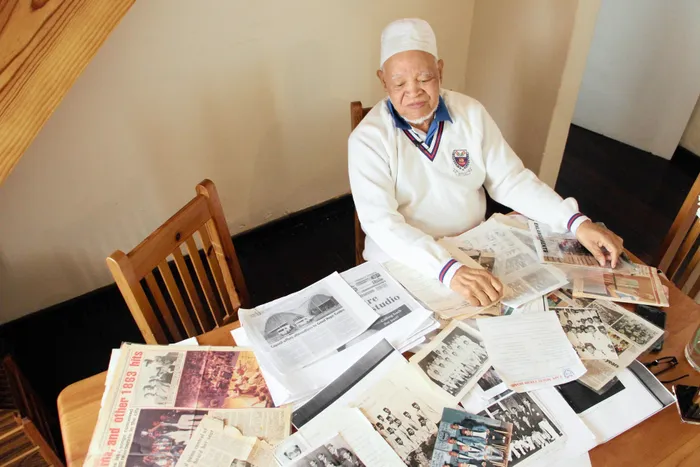Keeping Cape Malay's rich heritage on song

Cape Malay Choir Board president Shafick April takes a trip down memory lane. Yazeed Kamaldien Cape Malay Choir Board president Shafick April takes a trip down memory lane. Yazeed Kamaldien
Cape Town - Newspaper clippings, old black-and-white photos and booklets about the Cape Malay Choir Board are spread out on the table in Salt River where Shafick April talks about Cape Town’s traditional sounds.
April is the choir board’s president, a position he has held for decades, and wants to preserve Cape Malay songs composed during the Dutch colonial period that started in the late 1600s.
April’s ancestors were political exiles from the Indo-Malay region, enslaved to work for the Dutch in the Cape.
Most of them lived in Bo-Kaap, the historical inner-city slave quarter currently facing a wave of troubling gentrification.
The choir board is gearing up to marks its 80th anniversary next year.

AN ARCHIVE photo of a traditional Cape Maly choir. with men dressed in suits and red fez. Picture: Supplied.
April recalls that it was an honour to be part of a Cape Malay choir when he was younger.
“We joined a Cape Malay choir to impress our future fathers-in-law.
“It was a big thing to be part of a choir,” laughs April.
“I was 27 and joined the Boarding Boys (choir) in 1975. I became their representative at the board and soon became the board’s secretary.
“Then I became the treasurer and at some stage I took a break but returned and became the president.”
Having taken up this role in 1989, April became so entrenched that he witnessed the board’s various milestone anniversaries since it was established in 1939 in Bo-Kaap.
Preserving Cape Malay music, specifically the traditional Nederlandslied or Dutch song, is a key part of the board’s work. It is a song that Indo-Malay slaves had written two centuries ago. It is still sung in the traditional Dutch spoken in the Cape at that time. Some of the songs also arrived from Holland.
“The Niederlandslied is the heart of the choirs. We have a committee that has done research on how the Nederlandslied should be sung,” says April.
“We also have a committee that has compiled the songs and did research about it. They went through old books that were written with feather pens. We have to preserve it for the future.
“We have about 500 songs that we preserved. These songs are almost 200 years old.” Choirs passed these songs down from one generation to the next but the board verifies the songs and lyrics to ensure authenticity.
April says each choir registered with the board usually enters its annual singing competition where the Nederlandslied and other songs are performed.
April says they have 26 registered choirs, while two other boards have also started to organise choirs.
“Our choirs play an integral part in our society. Everybody has a cultural heritage and this is ours.
“This type of singing dates to the 1700s and we are working to preserve it,” April said.

Shafick April as a young man, seated at the end of the right-hand side of the front row. He joined the Boarding Boys choir and later became president of the Cape Malay Choir Board. Picture: Supplied
@yazkam